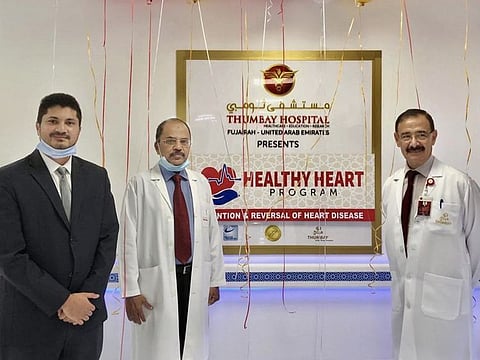Within 20 minutes of quitting smoking, heart and blood pressure normalises, doctor confirms
Thumbay Hospital Fujairah’s webinar reveals interesting facts about cardiac health

Dubai: Heart attack-induced deaths have come down in the last four decades with increased awareness and education among people on cardiac diseases and the need to follow healthy lifestyles.
This was the highlight of a webinar organised by Thumbay Hospital Fujairah on healthy lifestyles. Thousands of UAE recipients participated in the interactive session. The virtual event, organised as part of the group’s ‘Online Summer Healthcare Festival’, had experts responding to several queries from the participants, besides busting numerous myths surrounding heart conditions, exercise, eating habits etc.
When asked if people think heart disease can impact daily life, 98 per cent people responded in the affirmation, while only two per cent thought otherwise.
Speaking at the interactive web session, Dr Abdul Rahuman, Consultant Cardiologist at Thumbay Hospital Fujairah, said: “The number of deaths due to heart attacks has reduced drastically compared to the 1950s and 1960s, when 40-50 per cent patients died within a month after suffering a heart attack. The improvement can be attributed to advancements in the medical field, technology, surgical intervention, modern medicines and proper management techniques.”
Majority of heart patients recover well now
Dr Rahuman said that 95 per cent of patients are now able to resume their daily life after a heart attack and even in patients with heart pump failure, 70-80 per cent can now lead a normal life with medical support. “Very few people know that with appropriate guidance and timely intervention, it is indeed possible to live a completely healthy life even with heart conditions,” Dr Rahuman added.
Even though the death rate has come down, the risk factor remains alarmingly high due to unhealthy diet, physical inactivity, tobacco use and alcohol consumption. The effects show up in individuals as raised blood pressure, raised blood glucose, raised blood lipids and obesity.
Dr Rahuman advised participants to adopt heart-healthy habits that could make a big difference in the overall wellbeing of a person. “The risk from heart diseases can be significantly reduced by quitting smoking, avoiding trans-fats, exercising regularly, maintaining a healthy weight, controlling blood sugar and blood pressure, eating nutritious food and getting quality sleep for seven to eight hours every night,” said Dr Rahuman.
Quit smoking for a healthy heart
Sharing interesting insights about how quitting smoking can help people gain better control of their health, Dr Rahuman pointed out that within just 20 minutes after quitting smoking, people had seen their heart rate and blood pressure drop significantly. Moreover, damaged nerve endings began to regenerate after 48 hours of quitting smoking. Talking about the numerous benefits of quitting smoking, Dr Rahuman stressed that it can lower the risk of 12 types of cancers, chronic obstructive pulmonary disease (COPD) as well as cardiovascular diseases.
Talking about passive smoking, Dr Rahuman said studies had indicated an increase in risk of heart diseases for those exposed to it.
Active lifestyle a must for a healthy heart
Emphasising the benefits of exercise, Dr Rahuman endorsed an active lifestyle for adults with at least 150 minutes of moderate-intensity aerobic activity or 75 minutes of vigorous–intensity physical activity or a combination of both each week. Children and adolescents must also remain active for at least 60 minutes every day, Dr Rahuman recommended.
Guiding people on getting the right balance of different fats to keep cholesterol levels in check and maintain heart health, Dr Rahuman advised people to avoid trans-fat, limit saturated fats and replace these with essential polyunsaturated fats.
Fasting can heal
He said that diabetics must consume food with low glycemic index. “Fasting can also work as an essential tool in regeneration of trillions of body cells as it can promote autophagy — a vital process through which body’s cells clean out any unnecessary or damaged components, thereby providing abundant positive health benefits. Depending on the individual’s metabolism, significant autophagy may take two to four days of fasting in humans.”
Sign up for the Daily Briefing
Get the latest news and updates straight to your inbox









